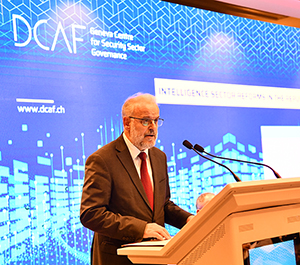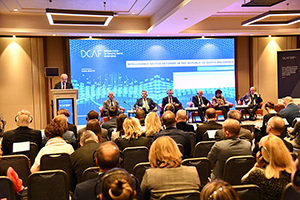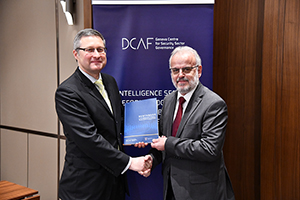 Wednesday, 11 December 2019
Wednesday, 11 December 2019
Address of the President Xhaferi at the Conference “Intelligence Sector Reforms in the Republic of North Macedonia: Achievements, Challenges and Priorities”
Distinguished Representatives of the Government,
Distinguished Colleagues,
Distinguished Director Grueber,
Distinguished Representatives of the Judiciary,
Agencies and Academia,
Your Excellencies,
Ladies and Gentlemen,
Allow me at the very beginning, to express appreciation, on my own behalf and on behalf of the Members of the Assembly of the Republic of North Macedonia to DCAF – the organizer of this Conference, whose topic, Intelligence Sector Reforms in the Republic of North Macedonia: Achievements, Challenges and Priorities, indicates that this is a continuous, in other words, an ongoing process. A process initiated as a result of our efforts for full-fledged membership in NATO and EU, within which the reforms in the security and intelligence sector and the reforms of the institutions competent for the oversight and scrutiny thereof, are marked as outstandingly important in terms of providing democratic transition and returning public trust in state institutions. Here, the Assembly, as a legislative house, and above all, as a temple of democracy and voice of the citizens and protector of their rights and freedoms, is the place where all needed reforms, necessary processes and protective mechanisms are being put in a legal framework, as a structure upon which all future reforms are built. DCAF, which is focused on states being safer in the framework of the democratic governance, rule of law and respect of human rights, has certainly recognized the need thereof and offered the Assembly a strategic partnership by ratifying the Memorandum for the implementation of the Project “Development of Parliamentary and Independent Oversight”, as part of the Intelligence Sector Reform Programme in the Republic of North Macedonia 2017 – 2020. It is my pleasure to confirm that the Project closely follows the dynamics foreseen in the Action Plan, and so far, as you are informed, the Assembly has adopted four laws in this area: The Law on Interception of Communications, Law on OTA, Law on the National Security Agency and the Law on Coordination of the Security and Intelligence Community. As a result of the implementation of these laws, we already have a functioning, independent Operational Technical Agency, National Security Agency and Citizen Oversight Council. I will say some more about the Citizen Oversight Council because it is a body which, although outside the Assembly, is still closely linked to the Assembly, in particular to the Committee on Interception of Communications. These two bodies should jointly determine, upon each complaint submitted by citizens who suspect that their communication is being intercepted, whether there has been a violation, or whether the services are performing their duties in line with the law and the accepted international norms. I am in constant contact with the Council and the Committee. I am aware of the challenges they face and I hope things will be defined and clarified so that we can have the first fruits of their work soon.
complaint submitted by citizens who suspect that their communication is being intercepted, whether there has been a violation, or whether the services are performing their duties in line with the law and the accepted international norms. I am in constant contact with the Council and the Committee. I am aware of the challenges they face and I hope things will be defined and clarified so that we can have the first fruits of their work soon.
Distinguished,
I can say with certainty that the Assembly, the services, and of course, DCAF have taken the project seriously, as confirmed by the intensity of the activities in the last year and a half aimed at preparing the members and staff of the relevant committees as to what parliamentary oversight means and how to effectively implement it. In particular, over twenty workshops were held to provide practical exercise on processing classified information and documents, and knowledge on how intelligence services should exercise their competence to ensure the safety of citizens within the law and with respect for the rights, freedoms and privacy of citizens. In addition to the workshops, there was a study visit to Slovenia, where the members and staff of the committees had the opportunity to see the sound-isolated room and the way it was used. I can contentedly say that we are making arrangements to devote a space within the legislature for that purpose, preparations are already under way, and equipment is being provided with funds allocated from the budget, and certainly with DCAF's unselfish assistance. Predictions are that in 2020, the room will be functional and useful for its intended purpose. Of course, the previous Handbook “Overseeing Intelligence Services: A Toolkit”, which was a product of cooperation with the parliamentary service, is of great benefit, and today's Handbook on the Implementation of Communications Interception Measures, which is a product of and for judicial practitioners within the DCAF programme, will further enrich the basis and framework of the intelligence sector reforms.
Ladies and gentlemen,
It is clear that reforms are neither easy, nor favorite, but we must not stop, we must keep up with the times and changes that each passing stage in our NATO and EU membership brings each new day. The day before yesterday, I was part of the delegation that  landed on the aircraft carrier "Harry S. Truman" and I can say that the feeling of pride was at its highest; we are part of that powerful alliance, part of NATO's capacities, contributing and reaping the benefits of that security. We certainly need to be prepared for that.
landed on the aircraft carrier "Harry S. Truman" and I can say that the feeling of pride was at its highest; we are part of that powerful alliance, part of NATO's capacities, contributing and reaping the benefits of that security. We certainly need to be prepared for that.
Dear colleagues and friends,
Certainly, reforms do not only imply adopting laws but also overseeing their implementation, and I believe that the future challenges we will be addressing would be to realistically realize the effects of their implementation on the ground, and of course, modify or upgrade them if needed. Of course, the oversight role of the Assembly as the representative home of the citizens will be fulfilled as it should under the Constitution.
Thank you for your attention!
sound-isolated room